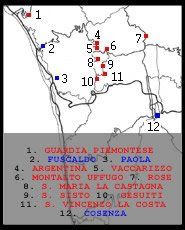Per queste prime presentazioni degli Occitani/Valdesi di Calabria saccheggio il sito (molto ben fatto, sebbene in costruzione) del Comune di Guardia Piemontese, al quale rinvio per maggiori informazioni.
I VALDESI
 Il movimento valdese, al pari di altri movimenti di rinnovamento cristiano, nasce come tentativo di riportare la Chiesa di Roma, corrotta dal potere e nei costumi, agli ideali evangelici e all'insegnamento di Gesù.
Il movimento valdese, al pari di altri movimenti di rinnovamento cristiano, nasce come tentativo di riportare la Chiesa di Roma, corrotta dal potere e nei costumi, agli ideali evangelici e all'insegnamento di Gesù. Questo movimento fu fondato in Francia, a Lione, nel 1174 ad opera di un ricco mercante, Valdès o Valdo (poi chiamato Pietro Valdo), il quale utilizzò una parte delle sue ricchezze per far tradurre le Sacre Scritture in lingua volgare.
I valdesi incominciarono a predicare gli insegnamenti di Cristo in tutta la Francia meridionale, denunciando il degradation of the Church and its immorality, until they were condemned as heretics at the Council of Verona (1184), that conviction became final in the fourth Lateran Council of 1215.
After the excommunication, their followers spread to northern Italy and from there it spread to Austria and Germany, where the anticipated movement, more than any other aspects that would later characterized the Protestant Reformation of the sixteenth century.
PIEDMONT POLICE
In red, the location for early settlement, the Waldensian
blue in other places where they live
blue in other places where they live
 No one knows when the Waldenses arrived in Calabria, or if they know the precise reasons.
No one knows when the Waldenses arrived in Calabria, or if they know the precise reasons. According to some scholars, they, I came around the XIII century, driven by the need to escape persecution in act in the Piedmont valleys, according to others, and this is the best hypothesis, their arrival can be dated in the first half of the fourteenth century because of lack of employment determined by the overpopulation of the Valleys.
In Calabria the Waldenses found very fertile lands, "ABSENCE hills and plains adorned with all sorts of fruit trees such as walnuts, chestnuts, olives, etc. melangolo., And land capable of receiving all sorts of seeds, did there paying conventions a tribute to the land it has, could live apart from each other and build a community or more, and make regulations, with the power to impose cuts and to demand without being obliged to take to account nor any other permission, except to each other " (Giglio, "Istoe des Eglises rèformèes autresfois applèes Vaudoises", Geneva, 1644) .
Of all the people of the valley got regular "instrument" confirmed by the King of Naples, Ferdinand of Aragon.
The Waldenses, in addition to Guardia Piemontese (then Call La Guardia), settled in other places in the present province of Cosenza, among which should be noted: Montalto Uffugo, Vaccarizzo, San Vincenzo La Costa and San Sisto of the Waldensians.
Among these settlements, Guardia Piemontese is currently, and for a very long time, the only place where you saved the ancient Occitan language, and until not so long ago, the use of the traditional costume.
The site was chosen probably because of its elevated position (approximately 514 meters above sea level) and was walled for defensive purposes, to include the ancient watchtower built (along with many others scattered along the Tyrrhenian coast) between eleventh and twelfth centuries in advance to report the incursions of pirates and Saracens. Here's how
is described by the Guardia Vegezzi - Ruscalla in his "Colonia Piemontese in Calabria" (Ethnographic Study - Turin, 20 November 1862) :
"In the extreme part of Italy, where the great chain of the Apennines bordering on the tepid waves of the Tyrrhenian Sea, at the foot of which is called the ridge Bitonto, between a stream of Rooms Boreas and the arrival of the staircase to Austria, the territory already in ancient times, the Republic Turina and now the province of Calabria Hither, Paola district, district of Cetraro, stands upon a Montagnuolo a paesuccio that, right on the registry Statistics from the administration in 1861, there were 1517 people dedicated to the peaceful care of the fields and in a special way to the culture of silkworms. Alpestre is its territory, but will thrive well the vine, the fig tree, olive, mulberry and grain, but what makes this country better known is a hot spring in old celebrity, whose waters are a powerful remedy for nervous affections which he derived the name of the nearby village Fuscaldo (Fons Calidus). It is named City Guard, and the speech of its citizens is different from the neighborhood of Commons, as the different style of dress of women, not some rural costumenze.
0 comments:
Post a Comment